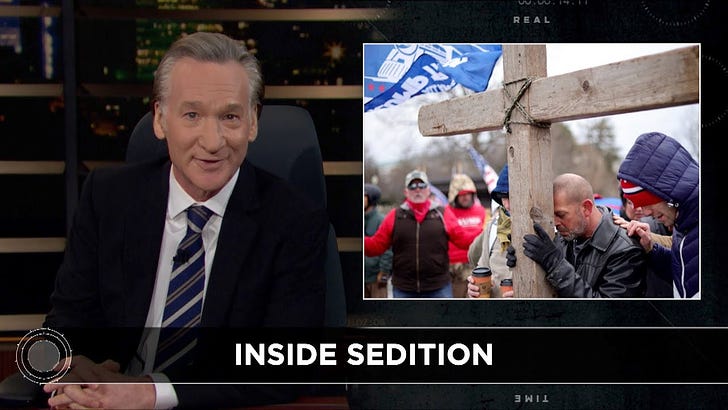I thoroughly enjoyed “Religulous,” Bill Maher’s 2008 documentary-examination of religious faith. But I have to be honest. My favorite part was the sweet truck driver who seemed to give Maher, a full-throated atheist, pause in Maher’s scorched-earth take on faith.
In the video above (from “Real Time with Bill Maher,” and thank you, Bill Y., for sending it), the comedian/social commentator talks about how adherents of Christian nationalism would be naturally drawn to participate in the deadly Jan. 6 insurrection, because believers have “already made space in their head for shit that doesn’t make sense.” A man could say over and over again that the sky is green, and in time, Christian nationalists would sign on to that because they’ve already decided to believe in an unseen Supreme Being and a green sky is not a big leap for them.
(In the above video, he also says fundamentalist Christians pair with QAnon like Chardonnay and Valium. Ouch.)
In this New York Times story, writer and scholar Kelly J. Baker draws a thick line between our recent insurrectionists and their embrace of Christian nationalism/exceptionalism, and the Ku Klux Klan, and their embrace of same. Once you’ve decided your religion is the One True Faith and all others are inferior or worse, then it’s not a big leap to start pushing the rest of your being (like your skin color) into an exalted position. Once humility is off the table, holier than thou slops out of the religion bucket onto everything else.
And it helps if you can shroud your racism in gentility. After a sputtering start during Reconstruction, in the 1920s, the Klan rebranded itself as an America First organization (sound familiar?) that emphasized (Protestant, no Catholics allowed) Christian exceptionalism. Meanwhile, behind the scenes, while publicly declaring a love of all humankind, Klan members organized one of the most efficient and recognizable home-grown terror cell intent on promoting white supremacy to its fullest.
Plenty of Protestants disavowed the KKK in its heyday — and plenty didn’t. When the KKK marched on Washington in 1925, they were tens of thousands strong — robes and all, and the marchers included more than a few elected officials.
Later, folks got a little more discreet, and a politician caught standing anywhere near a Confederate symbol could bid adieu to all those fundraising dinners.
No more.

These were the people Donald Trump appealed to throughout his presidency, the my-church-is-better-than-yours, the racist, angry kernel that rolls around in the gut of American theology. While we watch the start of the impeachment trial in the Senate today, remember that his base is still out there expecting that — metaphorically if in no other way — that the South’s gonna rise again.
For that reason and so many others, we must get this right.



